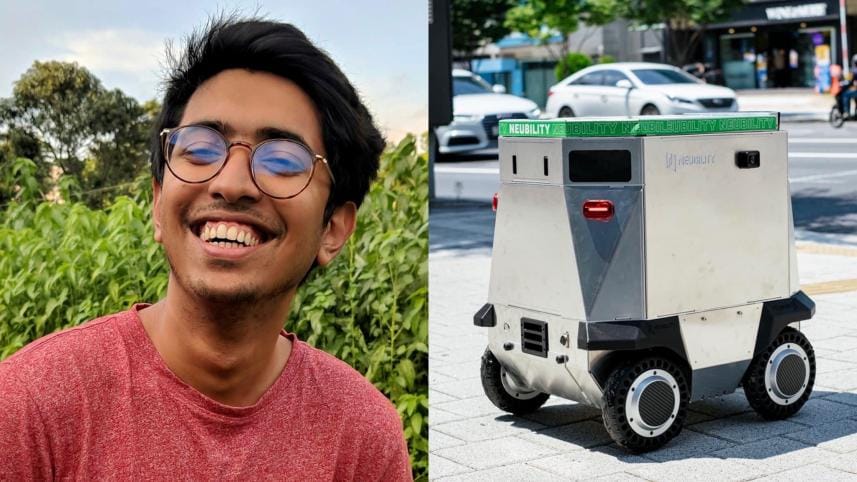Bangladeshi tech wizard developing food-delivery robots in South Korea

Born and raised in Bangladesh, Labib Tazwar Rahman co-founded Neubility, a Seoul-based start-up that develops autonomous food-delivery robots using vision-based localisation and path planning technologies. The platform researches and develops camera-based self-driving solutions and robotics technology, and focuses on last-mile autonomous robot delivery service.
Labib also founded InclusionX, a mental health and disability inclusion service in Bangladesh, which is used by over 30,000 people. He authored the Stanford Disability Language Guide, a book that considers disability equity in the words we use as an institutional community.
After finishing high school in Bangladesh, Labib went to Stanford University, USA. Back in 2015, Labib met Andrew Lee and Cheongho Cho through Conrad Awards, held at the NASA Kennedy Space Centre, Florida. Their team made it to the Top 6, and kept in touch long after the competition. They came up with the concept for Neubility together. "Initially, we were working on haptic feedback for gaming accessories and then for e-scooters. Eventually, Neubility pivoted to self-driving delivery robots," says Labib.
Owing to consistent growth in the e-commerce market, it is becoming increasingly difficult for Korean businesses to thrive with the cost of last-mile delivery. As a result, they are looking for more efficient alternatives, particularly in the form of automation, which is where Neubility comes in.
Neubility has managed investors and industry partners ranging from telecom to the automobile industry. The platform was recently presented as a top start-up at GSMA Mobile World Congress, Barcelona.
Labib has held research positions at Stanford Human-Computer Interaction Group, SLAC National Accelerator Laboratory, Stanford School of Medicine, and CERN. He is also involved with the Stanford Physics Society, as the co-president.
"By making processes digital, transparent, and accessible for all, we can do something good for people who come after us. I want to help others as well as myself to live our lives in a way that if we die old, we can go to our deathbed knowing that the world is a happier and easier place because we were there," shares Labib.
The author is a freelance journalist. Email: labibakabir99@gmail.com.



 For all latest news, follow The Daily Star's Google News channel.
For all latest news, follow The Daily Star's Google News channel.
Comments